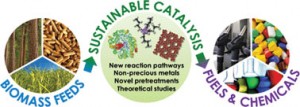 We are thrilled to announce that Catalysis Science & Technology’s new impact factor* has increased to 4.76.
We are thrilled to announce that Catalysis Science & Technology’s new impact factor* has increased to 4.76.
Huge thanks goes to all of our authors, referees and readers who have contributed to and supported the journal. Achieving this impact factor would not have course not been possible without this support and that of our dedicated Editorial and Advisory Board members.
Catalysis Science & Technology publishes high quality research from the multidisciplinary field of Catalysis, focussing on both the fundamental science of catalysis amd the science of catalysis technology. It publishes research faster than any other catalysis journal (read more here).
We invite you to submit your best work to our Editorial Office.
Read more about the 2013 Impact Factors from across RSC Publishing on the RSC Publishing Blog.
*The Impact Factor provides an indication of the average number of citations per paper. Produced annually, Impact Factors are calculated by dividing the number of citations in a year by the number of citeable articles published in the preceding two years. Data based on 2013 Journal Citation Reports®, (Thomson Reuters, 2014).













 Professor Ding Ma has become
Professor Ding Ma has become 